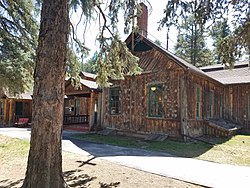United States historic place
| Evergreen Conference District | |
| U.S. National Register of Historic Places | |
| U.S. Historic district | |
 St. John's Episcopal Church in the Evergreen Conference District St. John's Episcopal Church in the Evergreen Conference District | |
 | |
| Location | CO 74, Evergreen, Colorado |
|---|---|
| Area | 7 acres (2.8 ha) |
| Architect | Jock Spence, et al. |
| Architectural style | Shingle Style |
| NRHP reference No. | 79000611 |
| Added to NRHP | May 1, 1979 |
Evergreen Conference District is a music conference center in Jefferson County, Colorado, near Evergreen. It was listed as a historic district on the National Register of Historic Places on May 1, 1979. The district is located at Highway 74 along Bear Creek.
Overview
The seven-acre conference center is owned by the Evergreen Music Conference, the Sisters of St. Mary's, and the Episcopal Church of the Transfiguration. The oldest continuing music center in the United States, in operation since 1907, has 23 buildings that include the Stone Library, Meeting House, St. Raphael's, and the Bell Tower.
According to History Colorado it is significant for its:
- appearance of early 20th century Evergreen and architectural features,
- connection with Canon Charles Winfield Douglas, an expert on the plainsong mass, and
- association with music, education, religion, and social/humanitarian activity
History
The land on which the district resides had been Ute, Arapaho, and Cheyenne hunting grounds. Traders and fur trappers passed through the land by 1821 and prospectors entered the area during the gold rush beginning in 1858. Bergen Park was established in 1859 when Thomas Cunningham Bergen built a log cabin and named his property. In 1877 Evergreen became its own place, unique from Bergen Park, in 1877 when Amos Post opened a trading post, followed by a general store, on what is now Evergreen's main street. He married Sarah Bergan, Thomas' daughter. The area was first called Evergreen when D.P. Wilmot expressed his admiration of the firs, spruce, and pines on the land he acquired about 1875 in Buffalo Park. Ranchers, loggers and farmers established themselves along Bear Creek. City dwellers established summer retreats in the mountainous region. Denver Mountain Parks between Morrison and Golden was established in 1991, which brought more people to the area during the summer.
In the 1880s a log bunkhouse was constructed for the use of lumbermen. Robert H. Stewart converted it into a hotel by 1872. He added eight guest cottages and called his property Sprucedale Resort. The first church meetings were held in the area in 1872.
Mary Neosho Williams, widow of Civil War General Thomas Williams, created a retreat center beginning in 1893 that ultimately evolved into the Evergreen Conference Center when she began holding Episcopal church services in tents. She purchased Stewart Hotel, which was transformed into St. Mark's in the Wilderness church, later Mission of the Transfiguration. Her daughter, Dr. Josepha Williams, also purchased land around the Evergreen area and received the former Stewart Hotel through her mother's will. She donated land and buildings for the creation of the center.
For recuperative reasons, Canon Charles Winfred Douglas, who was married to Josepha Williams, came to Evergreen for its summer retreats and music camps beginning in 1897. He led musical events, which increased the popularity of the center. He was priest of the retreat's church for more than 40 years.
The Episcopal church bought the resort upon Stewart's death and had John "Jock" Spence build some additional buildings and remodeled some of the existing buildings. The family of Canon Charles Winfield Douglas, an expert on the Plain-Song Mass, and Mary Neosho Williams (wife of General Thomas Williams) donated land and buildings for the district. Buildings from Frederick J. Bancroft's 2,500-acre ranch were also donated to the Evergreen Conference District in 1923.
References
- Sandy Crain (May 2, 1977). "National Register of Historic Places Inventory/Nomination: Evergreen Conference District / The Evergreen Conference Complex". National Park Service. Retrieved October 7, 2016. with accompanying 12 photos from 1977
- ^ "Evergreen Conference Historic District". Historical Commission, Jefferson County, Colorado. Retrieved October 6, 2016.
- "Jefferson County". History Colorado. Archived from the original on August 9, 2011. Retrieved October 6, 2016.
- "History". Evergreen Creative District. Retrieved October 6, 2016.
- ^ "Evergreen Conference District Nomination Form" (PDF). National Register of Historic Places. National Park Service. Retrieved October 6, 2016.
- Melanie Shellenbarger (November 1, 2012). High Country Summers: The Early Second Homes of Colorado, 1880Ð1940. University of Arizona Press. p. 238. ISBN 978-0-8165-2958-2.
- Thomas J. Noel (February 28, 2007). Guide to Colorado Historic Places: Sites Supported by the Colorado Historical Society's State Historical Fund. Big Earth Publishing. p. 178. ISBN 978-1-56579-493-1.
- "Jefferson County Neighborhoods: Evergreen". City Mountain Views. Retrieved October 4, 2016.
External links
- Evergreen Conference District Nomination Form, National Register of Historic Places
| U.S. National Register of Historic Places | |
|---|---|
| Topics | |
| Lists by state |
|
| Lists by insular areas | |
| Lists by associated state | |
| Other areas | |
| Related | |
39°38′13″N 105°18′47″W / 39.637°N 105.313°W / 39.637; -105.313
Categories: